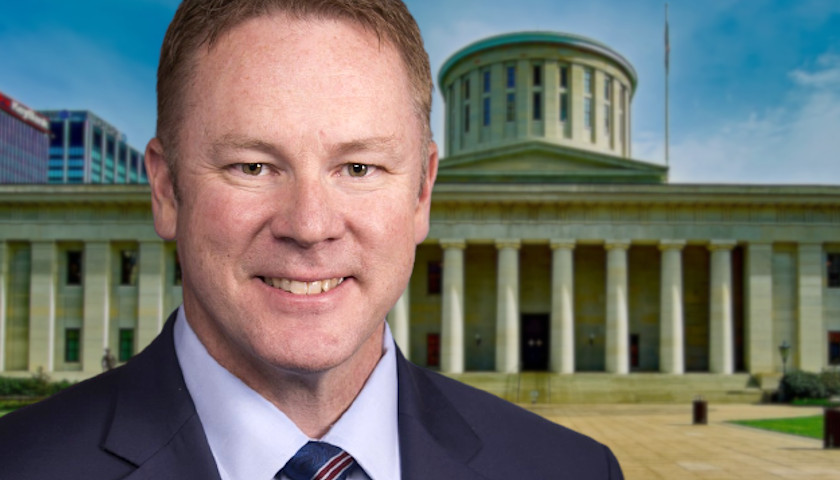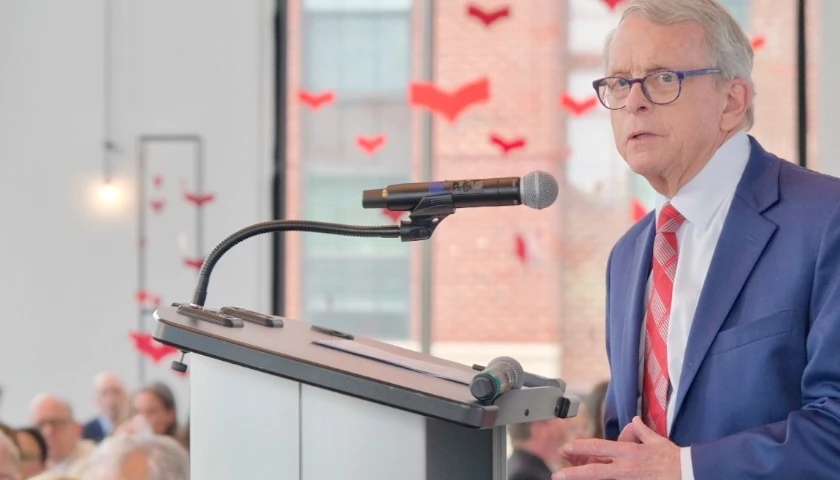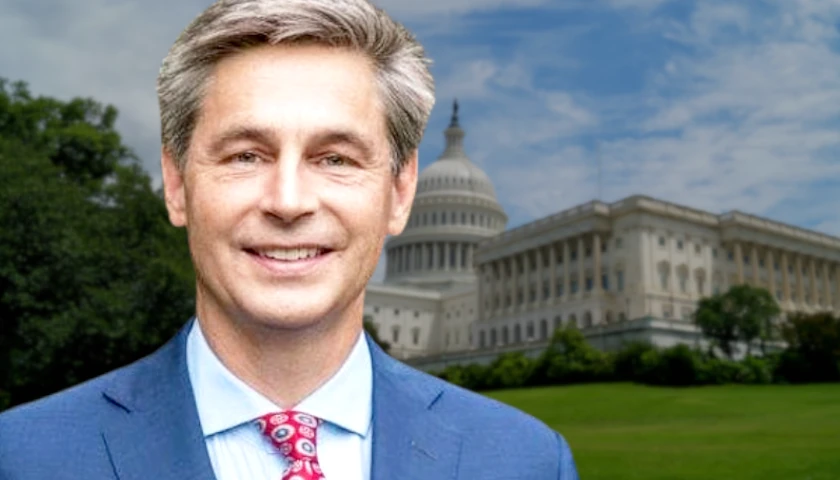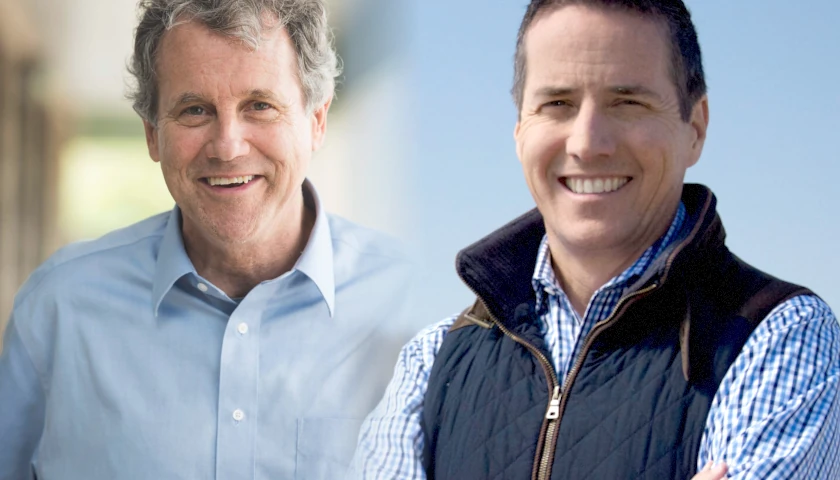COLUMBUS, Ohio – U.S. Congressman Warren Davidson (R-OH-08) said in early March that he was leaning more toward a run for governor than a bid for the U.S. Senate in 2022– that’s if he chooses to surrender his seat in the U.S. Congress.
“I’ve been asked about it by a lot of people I respect,” the two-term congressman told The Ohio Star about a prospective gubernatorial bid.
He added, “If I had the absolute perfect hand, I would not play those cards until September.”
Davidson won a seat in the U.S. House in 2016, winning his first bid for public office. He was an underdog that year in a special election called after then-Speaker of the United States House of Representatives John Boehner (R-OH-08) announced his resignation.
The Sidney, Ohio native took on a handful of notable elected officials yet ended up winning the 15-person race by eight points to secure the Republican nomination. He went on to win the special general election. Later in the year he won the traditional general election to keep the seat.
Davidson has won by wide margins since – in 2018 earning 66% of all votes and capturing 69% in 2020.
Before Trump left the White House he tweeted, “Who will be running for Governor of the Great State of Ohio? Will be hotly contested!”
Since then, three Republicans and one Democrat have said they will compete to be Ohio’s next governor.
Incumbent Mike DeWine is seeking the Republican nomination along with Ohio rancher Joe Blystone and Adam Rodgers. Democratic Mayor of Dayton, Nan Whaley, has also entered the race.
Although former Congressman Jim Renacci has yet to declare, he has conducted nine town hall meetings and just a couple weeks back declared on Twitter there was “big news coming from Team Renacci.” Later, releasing his plan to ‘Put Ohio First.’
A Harris/Quantum Communications poll sponsored by Citizens for a Better Ohio showed DeWine the likely candidate among only 29 percent of polled voters, while a Fabrizio, Lee and Associates poll listed DeWine at 34 percent. Both polls had Renacci in the lead – the former projected the Wadsworth businessman at 47% the latter at 42%. Those polls did not include Davidson.
A source told The Star that Governor DeWine’s team, while attending a Republican Governors Association series of meetings in Tennessee last week, expressed concern over a Warren Davidson run for governor.
The Star conducted an in-depth interview with Davidson. In this, the first of a two-part interview, Davidson discusses his background in the military, business and politics, as well as his predilection for 2020.
The Ohio Star (TOS): You grew up in Ohio and enlisted in the military right out of high school, correct?
Congressman Warren Davidson (WD): Yes. I grew up in Sidney, Ohio and graduated from Sidney High School. I enlisted out of high school in the Army Infantry.
I was stationed in Germany. I got there in the Spring of ’89 – the wall was up. We had live ammo and we were going to potentially roll to stop the Soviets from invading Europe. And when I was there, that’s actually when the Wall came down. Over Thanksgiving, some of my friends and I who were planning to go to Rome for Christmas, we changed plans and went to Berlin for Thanksgiving. We got to go through Checkpoint Charlie into East Berlin. We watched as people broke off chunks of the wall.
Later, my platoon leader asked if I had ever thought about being an officer and he helped me get into West Point.
TOS: At West Point you studied engineering?
WD: I majored in American History. If you don’t major in engineering, then you effectively minor in engineering – so I majored in history and effectively minored in mechanical engineering.
TOS: You were in special forces, correct?
WD: When I got out of West Point I went back into the infantry and served in the Old Guard, the 75th Ranger Regiment – which is part of special operations command but it’s Rangers instead of Special Forces. I was in Ranger Regiment, then I was in the 101st. All three are pretty elite in their own way.
The Old Guard is primarily a ceremonial unit. They do military, tactical, contingency missions – also secure the nation’s capital. The 75th Ranger Regiment is part of special operations command – and that’s definitely an elite unit. From my view, the most elite unit I was in for sure and probably the best job I can say that I’ve had so far. It was definitely an honor to be in Ranger Regiment.
Then went to the 101st – a great unit. It was considered the most combat-ready light unit that the Army had at the time.
I Got out of the Army in 2000, before 9/11. And that’s when I got into manufacturing.
TOS: Then you spent 15 years in manufacturing, some in your family business, yes?
WD: When I first got out I had no idea if I’d even like business. I ended up coming back to Ohio and started working with my Dad.
I was going to go work for a big company up in Chicago. My dad had encouraged me to come work with him. Because technology had changed the industry so much, I thought maybe I could help him.
To highlight that, a story I share: the guy who was the shop foreman at the time said, and this is a real quote, “I think all them computers are a fad.” This was Good Friday of 2000.
And so I said “you mean like the dot-com bubble?” And he goes “no, all them computers and stuff.”
That was a tipping point for me – I wanted to give my Dad some time. I turned down the job in Chicago and accepted the position working with him.
I ended up doing that for two years before I started my own company. And then I went to Notre Dame and got an MBA.
TOS: You started a business and went through the Notre Dame MBA program concurrently?
WD: I did that concurrently. And at the end of that time, my company had scaled and my Dad had not yet sold his business – so I offered to buy it for what he was asking on the market. We changed it a lot.
As I highlighted, the technology wasn’t there – we would have had to spend, literally, two or three million dollars to get competitive on the kind of machinery required to produce the robot bases to scale.
That wasn’t really a viable path. We changed it. We took the four metal stamping presses at the time and we scaled that, ultimately, to around 41 stamping presses. We sold the assets that made robot bases and transformed the business to focus on the production side. That became the main focus of that business – making components for oil filters.
We grew and diversified pretty nicely over the years.
That’s what I was doing in 2015 when John Boehner resigned. I no longer own the manufacturing businesses.
TOS: Speaker Boehner announced that he was resigning – take me back there. What inspired you to run in 2016?
WD: September of ’15 is when John Boehner announced that he was going to resign. I think that caught a lot of people off guard and by surprise. Probably like a lot of people, I wondered who would be our next Speaker of the House and then, in my case, who would be my next member of Congress.
Pretty quickly, a lot of your traditional candidates got in – a state senator [Bill Beagle], a state rep [Tim Derickson], and a county elected official. There were a couple of people already challenging the Speaker – against long odds, obviously.
The field got pretty crowded. By October I was receiving invitations to fundraisers. I figured I’d probably see who the candidate was and donate.
Then in November a couple people stopped in my office to raise money for an additional cause, a different campaign. They asked, ‘who are you going to back in the Congressional race?’ I said, ‘you’re the political people, so who are conservatives going to get behind?’
They said, ‘you know, it’d be great if there was an Army Ranger, business guy in the race.’
We laughed because it was crazy. We moved on and finished our conversation. I went home and told my wife about my day and I thought she would just laugh as well. I told her the story and she goes, ‘well, what did you tell ‘em?’ I said ‘well, we laughed because it’s crazy.’
She responded ‘no, it’s not, you’d be great at that. You should call them back. This is for our country, somebody’s going to have to do it or we’re just going to keep getting the same kind of people.’
And so eventually we took a look at it and, frankly, one of the big factors was her brothers. Her brothers are union Democrats who were ultimately going to back Trump – even if he was a Republican nominee.
She said, “if my brothers are going to vote for anyone other than a Democrat this is the kind of time you ought to think about it.’
We put together a campaign plan. We talked to friends, prayed a lot about it and felt like we should get in – with no guarantee of how it would turn out.
We entered the race 10 minutes before the filing deadline.
We had a 90-day sprint and won a 15-way race by eight points. It was amazing all the things that came together – just a lot of friends and new friends that worked hard: knocked doors, made phone calls, everything to get the word out.
TOS: And so now here you are: ’16, ’18 and then again in ’20.
WD: Yeah, and Ohio’s moved. If you’re familiar with the Cook Index – when I first ran in ’16 the district was considered R12, in ’18 it was R15, in ’20 it was R17 and this year they updated it after the election and now it’s supposed to be an R20.
The district keeps getting redder and I’d love to take some modest amount of credit for it but the Democrats have pushed a lot of traditional Ohio folks to say ‘I can’t really vote for that.’
These are people who want to respect the flag, support the police, people who don’t think boys should play girls sports. That doesn’t inherently make them a Republican but they’re not going to vote for a Democrat.
TOS: When you look at 2022, what catches your attention about the races enough to consider running?
WD: I’m excited about what I’m doing in the House. I’m energized that we’re going to be able to take back the House. At this time, a lot of the leadership has learned lessons from 2018 – when we’re on offense, we’re going to have to learn how to play offense this time.
We had a good playbook last time but unfortunately Paul Ryan [former U.S. House Speaker] didn’t call some of the good plays. I think if he did, and we had shown a little more tenacity when we were in the majority, we’d probably still be in the majority. You never know.
But I do feel like we’re headed to the majority in the House in 2022.
Prior to the fall of 2020 I had never spent a day thinking about what it would be like to be a governor. As the course of the year went on I was not critical of Mike DeWine personally, per se, but certainly of some of his policy decisions.
That resonated with people to the point that enough folks – people I and others respect greatly – approached me about running for governor that I started thinking maybe I should pull up the org chart and see what it would take to do this job; and what kind of difference would it make if we actually had a conservative government, a conservative governor versus just a Republican governor.
There are a lot of things that I think would be well received – the events of the past year highlighted that. Notably, I think a lot of places experienced governor envy, states did.
We could have had it worse, I don’t think anyone is saying that our state was the worst place to be in 2020 but there are a lot of people looking longingly at Florida and the policies that they implemented with near identical outcomes healthwise, but very different outcomes for civil liberties and their economy.
TOS: Are you going to run for Governor of the State of Ohio?
WD: I’ve been asked a lot about that – that’s the reason I’m taking it seriously. I’ve been asked about it by a lot of people I respect. It’s very humbling.
If I had the absolute perfect hand, I would not play those cards until September.
The Ohio Star‘s interview with Rep. Davidson continues in Part Two, and will unpack what he would have done differently over the past year, how an ‘America First’ agenda translates to the role of governor, and how he views the financial viability of the country and Ohio.
– – –
Jack Windsor is Statehouse Reporter at The Ohio Star. Windsor is also an independent investigative reporter. Follow Jack on Twitter. Email tips to [email protected].





